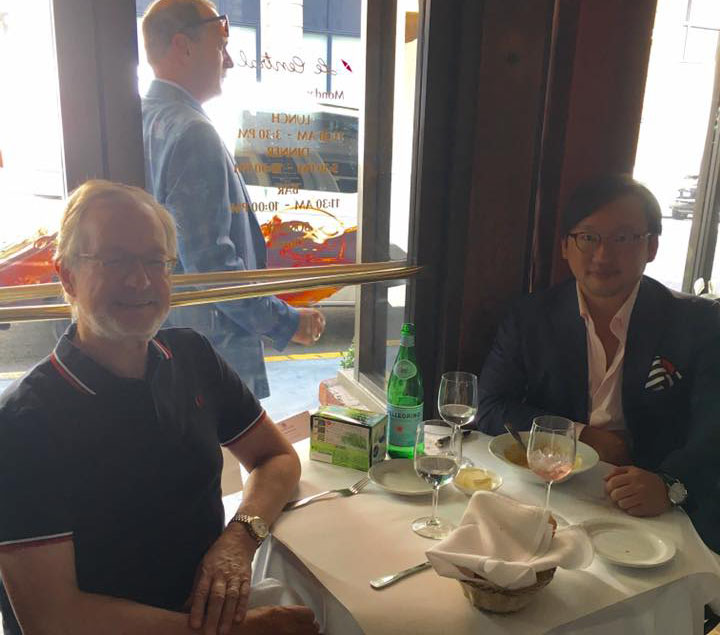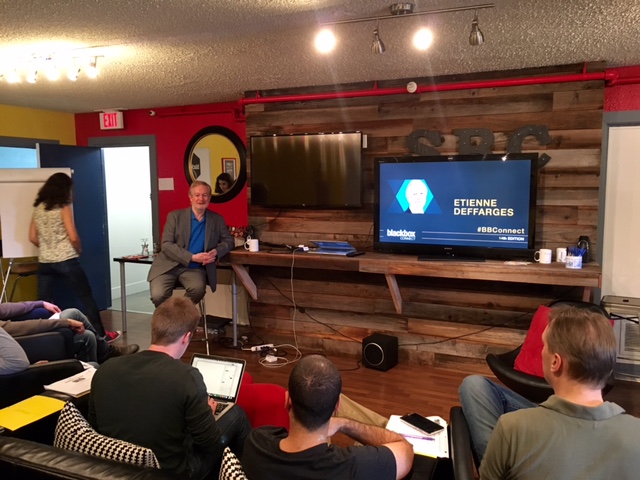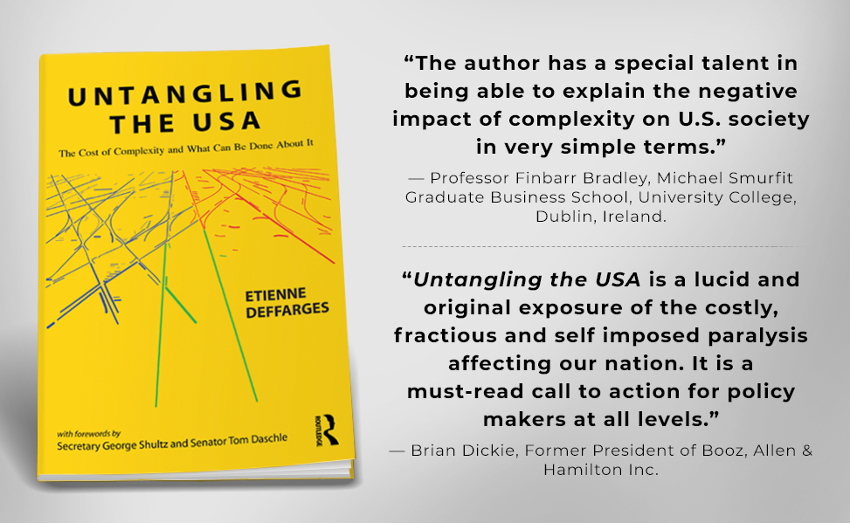How can startups raise money from angel investors during the COVID–19 Pandemic?
Ten factors to take into account.
By Etienne Deffarges, Global Board Member of the Harvard Business School Alumni Angels
![]()
His talk about the entrepreneurship & innovation at Blackbox ( Acceleration Program in San Francisco)
1: Who are angel investors?
Angel investors provide seed and early-stage funding to thousands of start-ups every year. It is estimated that angel investments in the U.S. totaled about $5 billion in 2019 as well as in 2018, mostly from Silicon Valley but also in areas like Boston, Chicago, New York and Southern California.
In a typical case repeated over and over again, an entrepreneur starts a company with some personal money and financial help from family and friends. Once the company has reached certain milestones, such as proof of concept and perhaps some early-stage revenue demonstrating the validity of its technology and business model, it can launch fund raising efforts with angel investors in what is called a seed round.
Subsequent rounds include A, B, C, D etc. rounds financed by venture capitalists (VCs), until an exit, acquisition or IPO, if things go well. Seed rounds involving angels range between $300,000 and $3 million, typically about half-a-million dollars in size, at pre-deal valuations ranging between $3 million and $12 million.
Angel investors are experienced business people, many with a scientific background, and often successful entrepreneurs themselves. Most angels belong to clubs such as the Harvard Business School Alumni Angels and the Band of Angels, where individual investments are grouped together.
This is necessary, because the typical check written by an angel investor is small, round $25,000. To reach amounts over a million dollars, there is often a “syndication” process among various angel clubs—angel investing is a very collaborative and collegial activity. This is important, because while angel investors want to make money on their investments, they are also driven by a “passion” for entrepreneurship.
They like to help young companies with their dollars and foremost early-stage operational expertise, remembering that as entrepreneurs they often also benefitted from such help while growing their own company.
2: Impact of the Coronavirus pandemic on angel investing: Fewer deals, with more focus on selected industries.
Not surprisingly, with so much economic and health uncertainty, the pace of seed investments by angels has slowed down significantly in 2020. Looking at the first three quarters of the year, most estimates show that the number of deals has plunged 40% to 50% relative to the same period in 2019.
Invested capital in seed rounds is down less, by about 30% to 40% relative to last year, because angel investors have focused on a narrower range of industries, where they have more knowledge and are confident enough to write relatively large checks.
Healthy seed deal average size also means that valuations in the industries viewed positively by angels during the pandemic, such as healthcare, remain high by historical standards—with few “coronavirus discounts.”
3: Angel investors had to spent time on remedial operations during the pandemic—leaving less time for new deals.
One factor that is not to be ignored is that most angel investors have portfolios of many early-stage companies, typically in the 20 – 50 range. When the Coronavirus pandemic hit in March of this year, with lockdowns in many areas of the U.S., most angels spent time using their financial and operational expertise to help their portfolio companies conserve cash, customers, and survive the economic crisis unleashed by the pandemic.
This was time that angels could not spend in pursuing new deals, hence the slowing down in new angel investing activity. My estimate here is that for most angel investors, at least half of their portfolio companies were affected negatively by the COVID-19 crisis and required some type of remedial action.
On the other hand, the pandemic and the ensuing changes in both working and consuming habits also put a favorable spotlight on many existing investments, such as in last-mile delivery; fin-tech; at home healthcare services; telehealth, etc. This helped provide a silver-lining to the crisis.
![]()
4: The silver-lining behind COVID-19 and the case for optimism.
Despite the slowdown in angel activity, there is a case to be made for optimism in seed capital funding for start-ups moving forward. To understand this, we need to look at the overall venture capital picture.
One segment of the VC industry and entrepreneurial finance that has remained very buoyant is the one for very large deals, of $100 million or more. Multibillion-dollar IPOs, such as Palantir and Asana recently (both with direct listings) and other technology companies like Amwell; JFrog; Snowflake; Sumo Logic, and Unity Software, have been plentiful by any historical standard, totaling well over $50 billion this year.
This means that a lot of liquidity is now available in Silicon Valley. And it is a fair bet that some of that liquidity will reach many start-ups, keeping seed round activity very healthy in 2021 and 2022—when there are lots of IPOs, the whole “financing pipeline” for young entrepreneurial companies remains in good shape.
5: Some industry sectors have been buoyed by the pandemic.
The focus on enabling work at home and delivering goods, services and healthcare to people’s homes has created areas of “Covid growth” that have accelerated entrepreneurial financing tremendously in these areas, from seed funding to very large deals.
Changes that have been forced upon us by the pandemic have transformed our working habits, and many of these changes will long outlast the pandemic. Yes, attending zoom meeting after meeting in my home office can be tedious at times, but my productivity as a board member has increased tremendously.
I live in San Francisco, and am on a couple of healthcare boards in Boston and New York. Each of them meets four times a year. For me, a six-hour board meeting followed by a dinner means almost a three-day commitment, given the six-hour transcontinental flights, long drives to and from airports, and the three-hour time difference. Now, instead of this three-day trip with two hotel nights, I spend six hours in my home office—to which the commuting time is measured in seconds.
The time savings are even larger with board meetings that used to take place in Europe. Similarly, our consumer habits have now become resolutely online oriented, with a renewed focus on online retailing and last-mile delivery services.
All this has created a lot of opportunities for companies that operate in the industry sectors that facilitate these new working and consuming habits—starting with the delivery of healthcare services, crucial during a pandemic.
6: In the pandemic, consumer healthcare and wellness are emerging as areas of spectacular growth.
Consumer healthcare and wellness have seen angel activity increase significantly during this pandemic, relative to 2018-2019. Companies using technology to facilitate homecare, online prescription filling, insurance-tech and healthcare management have all seen a jump in investments, from seed capital to much bigger later rounds.
For example, health insurance provider Oscar has raised over $1.5 billion in total financing, benefitting from a trend among U.S. patients to buy their health insurance directly from a healthcare provider, as opposed to a traditional health insurer.
Wellness was also a growth industry before the pandemic, with many successful young companies in the areas of nutrition, fitness (e.g. Fitbit) and at home exercise (e.g. Peloton). Now it is positively booming, with people trying hard to maintain a healthy lifestyle within the confines of their homes.
7: Telehealth is also clearly a sector with very bright prospects, potentially transformative for healthcare.
Telehealth, which was considered almost a peripheral sector in the U.S. healthcare $3+ trillion universe, is now experiencing transformative growth, for obvious reasons—during a pandemic, patients are reluctant to go to the hospital or even visit their doctor.
The U.S. government, through its Center for Medicare and Medicaid Services, or CMS, has set-up new reimbursement rates for telehealth, facilitating this growth, and private health insurers are following. The Covid-19 pandemic has seen a cascade of angel and VC investments in telehealth start-ups, in companies like Arista MD; BrightMD; Cyber MDX; Datos Health; RelayOne; Silver Cloud Health; Sonder Mind; Transparent Health Market Place; Tyto Care; and 98point6.
More established telehealth companies include Amwell, with a recent IPO; Dispatch Health; Heal; Ro; and ThriveEarlierDetection, which have all raised several hundreds of millions of dollars since their seed rounds.
![]() He is often invited to give a talk for many startup events, accelerators, for supporting founders from around the world came to San Francisco
He is often invited to give a talk for many startup events, accelerators, for supporting founders from around the world came to San Francisco
8: And let’s not forget the global quest for a vaccine, with spotlight on clinical trials and many opportunities.
The desperate quest worldwide for a Covid-19 vaccine has also put a spotlight on clinical trials. Myriad companies, from start-ups to global pharmaceutical giants, are active in this sizzling hot space. Early-stage companies can easily access the seed funds they need from angel investors (as well as from very large corporations acting as strategic partners), as long as they can make any semi-coherent claim that they will help shorten the duration and improve the effectiveness of clinical trials.
These early-stage companies focus on specific sub-segments of the clinical trial process, two of the most visible ones being data security and the recruitment of volunteer patients.
They are typically financed not only by angel investors—at the very beginning, pre-seed deal valuations are low, in the $3 million to $10 million range—but also by early-stage VCs eager to establish a toehold in this very fast-growing sector. For the angels, this is a “elephant hunt” pursuit, with very high risks of failure but also significant potential rewards.
Examples of such early-stage companies in this area include Clara Health; Deep Link Medical; Deep6 AI; Inato; Ripple Science; and Clinical Trial Connect, recently acquired by the much larger Trial Scope. All these companies raised at least $5 million in seed capital and early stage rounds.
9: The role of strategic partners.
Historically, entrepreneurs have gone from personal financing to angel investors, often with in-between a “graduation” from an “accelerator” incubating start-ups. Then angels make way for VCs, from the A and subsequent rounds to hopefully a successful exit.
However, it is important to stress that angels can also direct the early-stage companies they support to strategic partners. These strategic partners are deep-pocketed industrial groups that see the success of the start-up they embrace as an imperative for their own operations.
As such, they may provide funds through multiple rounds at lower costs for the early-stage company than VCs and can also provide deep sector expertise and a ready-made market for the goods and services produced by the start-up.
For example, a start-up developing the ultimate “robotic eye” can find strategic partners among large automotive companies (driverless cars), aeronautical groups (no visibility flying) and even manufacturers of automated domestic appliances.
10. Early globalization stages for angel investing.
During a pandemic, when the number of deals available to angel investors goes down, as well as the desire of individual angel club members to invest, it makes sense to reach outside a given city, or region, to increase growth.
For example the Harvard Business School alumni angels now have 15 “chapters,” or affiliated local angel clubs in eight different countries spread across five continents. Angel investors have historically focused on local companies—if you live in the San Francisco Bay Area, why go beyond Silicon Valley?—so they can be close to the entrepreneurs of the companies they invested in.
This way, problems can be discussed over coffee or lunch, and the benefits of active networking are available to all living nearby. However, as many other centers of entrepreneurships have emerged, in areas as diverse as agriculture, bio-tech, fin-tech, media and cyber security, Silicon Valley no longer has a strong-hold on entrepreneurship and angel investing.
Even though the Valley is still the largest area of angel investment, new concentrations of entrepreneurial finance have emerged in Chicago; Boston; New York; Los Angeles; and beyond the U.S. in countries as diverse as Israel, India and Brazil.
Therefore, it makes sense for active angel investors to start cultivating global networks of like-minded seed round investors, so that they can share contacts, experiences, and early-stage opportunities.
![]() John and Etienne at Blackbox (Accelerator in San Francisco)
John and Etienne at Blackbox (Accelerator in San Francisco)
Etienne Deffarges
NC Chairman and Global Board Member of the Harvard Business School Alumni Angels
Etienne Deffarges is a Co-Founder and Operating Partner at Chicago Pacific Founders, a private equity firm focusing on health care delivery providers. Etienne is a serial entrepreneur who participated in several IPOs and exits—most recently Accumen, a health care laboratory excellence company.
He is the author of “Untangling the USA: The Cost of Complexity and What Can Be Done About It,” published by Routledge, Taylor & Francis. He serves on the boards of Alain Ducasse Enterprises, Atrio Health, Sight MD, the Harvard Business School Alumni Angels, and is a board advisor at AEye. He is a member of the Executive Council at the Harvard T. H. Chan School of Public Health.
From 2004 to 2014, Etienne was part of the founding management team, EVP and Vice- Chairman of R1 RCM, a healthcare IT company. He took the company public in May 2010, at a $1.2B valuation. He also established the company as a healthcare partner with the World Economic Forum in Davos, Switzerland. Prior, Etienne was Global Managing Partner, Utilities, and member of the Executive Committee and Global Management Council at Accenture. He participated in the company’s IPO on the NYSE in 2001, at a $14B valuation. He was the first Market Maker at Accenture, negotiating several billion $ deals successfully. Before, Etienne was Senior Partner and Global Practice Leader, Energy, Chemicals & Pharmaceuticals at Booz Allen Hamilton.
Etienne holds a MBA from the Harvard Business School, where he graduated as a Baker Scholar; a MS in civil engineering from UC Berkeley; and BS/MS degrees from ISAE/Sup‘Aero in aeronautical engineering.
シリコンバレーの著名エンジェル投資家が語る コロナ禍におけるエンジェル投資

サンフランシスコ在住のEtienne Deffarages氏は、ご自身で起業しナスダックにIPOしたご経験やエンジェル投資にて数々のエグジット実績を持つ著名エンジェル投資家です。素晴らしい人格者でもあり、私のメンターでもあるEtienne氏に、コロナ渦におけるエンジェル投資についてインタビューをさせて頂きました。この記事が、読者の皆様が現在の逆境を乗り越える手助けとなることを祈っています。

– 目次 –
エンジェル投資家とは?
エンジェル投資家は、毎年数千社のスタートアップ企業にシードやアーリーステージの資金を提供しています。米国でのエンジェル投資は2018年と同様に2019年も約50億ドルと推定されており、そのほとんどがシリコンバレーからのものですが、ボストン、シカゴ、ニューヨーク、南カリフォルニアなどの地域でも行われています。
はじめに、歴史的に見ても、何度も何度も繰り返されている典型的な起業の仕方についてお話ししましょう。まず起業家は、ある程度の個人資金と家族や友人からの金銭的援助によって会社を立ち上げます。次に、概念実証(Proof of Concept)など、技術やビジネスモデルの妥当性を示す初期段階になると、エンジェル投資家からの資金調達を開始します(シードラウンド)。その後、ベンチャーキャピタル(VC)が出資するA、B、C、Dなどのラウンドがあり、うまくいけば、エグジット、買収、IPOが行われます。
エンジェルが関与するシードラウンドは、30万ドル~300万ドル(約3000万円~約3億円)の間で資金調達を行う場合が多く(通常、約50万ドル<約5000万円>規模)、その後、 300万ドル~1200万ドル(約3億円~約12億円)の企業価値評価となるのが一般的です。
エンジェル投資家一人ひとりの典型的な投資額は25,000ドル(約260万円)で、シリコンバレーでさえ小さいものです。そのため、100万ドル(約1億円)を超える金額に到達するには、多くの場合、様々なエンジェル協会での「シンジケーション(複数のエンジェル投資家が、共同でスタートアップに投資すること)」が必要となります。シリコンバレーのエンジェル投資協会(シリコンバレーのエンジェル投資家は、ハーバード・ビジネス・スクールの同窓生によるエンジェル協会 Harvard Business School Alumni AngelsやBand of Angels などに所属しています。)は、よくシンジケート投資を行います。エンジェル投資家は、利益を追求する一方で、起業家精神への「情熱」に駆られていて、互いに非常に協力的な面があります。
とにかく、私達はスタートアップを支援することが好きなのです。エンジェル投資家は、科学的なバックグラウンドを持ち、起業家として成功した経験を持つ、経験豊富なビジネスパーソンである場合が多く、それは起業家にとってもプラスに働くと思います。
コロナ渦におけるエンジェル投資

ーGreat lunch meeting in the French restaurant in San Francisco
それでは、新型コロナウイルス感染症がエンジェル投資にどのような影響を与えているのかを見ていきましょう。
新型コロナウイルスの大流行がエンジェル投資に与えた影響
驚くことではありませんが、新型コロナウイルス感染症による経済と健康の不確実性がある中で、シード投資のペースは2020年には大幅に鈍化しており、1~3月を見てみると、案件数は2019年の同時期と比較して40~50%も激減しています。
エンジェル投資に関すると、知識が豊富で、なおかつ狭い範囲の業界に焦点を当てているため、比較的大きな小切手を書く自信があるようで、昨年と比較して約30~40%減少となりました。
ただし、ヘルスケアなど、パンデミック時にエンジェル投資家からポジティブに見られていた業界のバリュエーションは、過去と比較しても高水準を維持しており、「コロナウイルス割引 (coronavirus discounts : コロナ渦でも投資をし易くする為にバリュエーションを通常時より低くする)」もほとんどありません。
なぜ投資案件が減少したのか
エンジェル投資家は、ポートフォリオ (投資先の企業リスト)内に通常20~50社のアーリーステージのスタートアップを保有しています。2020年3月に新型コロナウイルスのパンデミックが発生し、米国の多くの地域でロックダウンが発生した時、ほとんどのエンジェル投資家は財務や運営の専門知識を駆使し、ポートフォリオ企業がこの経済危機を乗り切るために時間を費やしました。
そのため、新規案件の追求に費やす時間がなく、新規のエンジェル投資活動が鈍化したのです。恐らく、ほとんどのエンジェル投資家にとって、少なくとも半数の投資先企業が今回のパンデミックの影響を受け、何らかの改善策を必要としていたのではないでしょうか。
コロナの後にある希望の兆し:楽観主義
一方で、パンデミックとそれに伴う労働習慣と消費習慣の変化は、ラストマイルデリバリー、フィンテック、在宅医療サービス、テレヘルスなどへの注目を集め、希望の兆しが見えてきました。
また、エンジェルの活動が鈍化しているにもかかわらず、今後のスタートアップ企業のためのシードラウンドの資金調達には楽観的な見方があります。
これを理解するためには、ベンチャーキャピタルの全体像を見る必要があります。ベンチャー・キャピタル業界と起業家の中で、非常に好調を維持しているのは、100Mドル以上(105億円以上)の超大型案件です。
最近のPalantirやAsanaのような数十億ドル規模のIPO(いずれも直接上場)や、Amwell、JFrog、Snowflake、Sumo Logic、Unity Softwareのようなテクノロジー企業のIPOは、歴史的に見ても豊富で、今年の総額は50Bドル(約5兆2800億円)をはるかに超えています。
これは、シリコンバレーに多くの流動性(liquidity)あることを意味します。そして、その流動性の一部が多くのスタートアップ企業に投資されることで、2021年と2022年にはシードラウンドの活動が活発になり、IPOが多い2021年と2022年には、若いスタートアップのための「資金調達パイプライン」全体が良好な状態を維持することになるだろうと考えられます。
“COVID Growth”分野の誕生
在宅での仕事を可能にし、商品、サービス、ヘルスケアを人々の家庭に届けることに焦点を当てたことで、「“COVID Growth”(コビット成長)」という分野が生まれ、この分野ではシード資金から大規模な案件まで、起業家の資金調達が飛躍的に加速しました。
パンデミックによって私たちに押し付けられた変化は、私たちの仕事の習慣を一変させました。確かに、自宅からオンライン会議に次から次へと参加するのは退屈なこともありますが、役員としての生産性は飛躍的に向上しています。
私はサンフランシスコに住んでいますが、ボストンとニューヨークにあるいくつかの医療委員会の委員をしており、それぞれ年に4回の会議を行っています。私にとって、6時間の役員会の後に夕食をとるというのは、6時間の大陸横断便、空港への長距離移動、3時間の時差を考えると、ほぼ3日間のコミットメントを意味します。それが今では、2泊3日の旅行ではなく、自宅のオフィスで6時間過ごすだけでよく、通勤時間は秒単位になります。以前、役員会議が行われたヨーロッパを基準にすれば、この時間の節約効果はさらに大きくなります。
また、私たちの消費習慣は今、オンライン販売やラストマイルデリバリーに新たな焦点が当てられ、断固としてオンライン志向になっています。
このような新しい働き方や消費習慣を促進する産業分野で事業を展開する企業には、多くのチャンスが生まれています。
大注目は消費者向けのヘルスケアとウェルネス
中でも、消費者向けヘルスケアとウェルネスは、2018-2019年と比較して、このパンデミックの間にエンジェルの活動が大幅に増加しています。在宅ケア、オンライン処方箋、保険、ヘルスケア管理を容易にする企業は、すべて、シードからはるかに大きな後のラウンドに至るまで、投資が急増しています。
例えば、健康保険プロバイダーのオスカー(Oscar)は、従来の健康保険会社ではなく、ヘルスケアプロバイダーから直接健康保険を購入するという米国の患者の間でのトレンドの恩恵を受けて、1.5B ドル(約1580億円以上)の資金調達を行いました。
ウェルネスもまた、パンデミック前から成長産業であり、栄養、フィットネス(Fitbitなど)、自宅でのエクササイズ(Pelotonなど)の分野で多くのスタートアップが成功を収めていました。現在も、家庭内で健康的なライフスタイルを維持しようと努力している人々の姿が見られ、ポジティブなブームとなっています。
変革的な成長を遂げるテレヘルス
米国には、3trillionドル (約320兆円)を超えるヘルスケア市場があります。その中でも特に、テレヘルスは変革的な成長を遂げています。
米国政府は、メディケア・メディケイド・サービスセンター(Medicare and Medicaid Services:CMS)を通じて、遠隔医療に対する新たな償還率を設定し、この成長を促進していますが、民間の医療保険会社もこれに追随しています。
コロナウイルスの大流行により、Arista MD、BrightMD、Cyber MDX、Datos Health、RelayOne、Silver Cloud Health、Sonder Mind、Transparent Health Market Place、Tyto Care、98point6 などの企業で、遠隔医療スタートアップへのエンジェルやVCの投資が続々と行われています。
より確立されたテレヘルス企業には、最近 IPO を行った Amwell、Dispatch Health、Heal、Ro、ThriveEarlierDetection などがあり、これらの企業はいずれもシードラウンド以降、数億ドルの資金調達を行っています。
世界が求めるワクチン
新型コロナウイルス感染症に対するワクチンの世界的な必死の探求は、臨床試験にもスポットライトを当てています。スタートアップから世界的な製薬大手まで、無数の企業がこの熱気あふれる空間で活動しています。
アーリーステージのスタートアップは、臨床試験の期間を短縮しつつ効果を向上させるという主張をすることで、エンジェル投資家および戦略的パートナーである大企業から必要なシード資金を調達することが容易になっています。さらに、この急成長分野で地位を確立したいと考えているアーリーステージのVCからも資金を得ています。(初期段階では、プレシード案件の評価額は3Mドル~10Mドル<約3億1500万円~約10億5000万円>と低額です。)
エンジェル達にとって、これは「象狩り」のようなもので、失敗のリスクは非常に高いが、大きな報酬を得る可能性もあります。この分野のアーリーステージ企業の例としては、Clara Health、Deep Link Medical、Deep6 AI、Inato、Ripple Science、そして最近、より大きなTrial Scopeに買収されたClinical Trial Connectなどが挙げられます。これらの企業はすべて、シードキャピタルとアーリーステージラウンドで少なくとも5Mドル(約5億2800万円)を調達しています。
戦略的パートナーの役割

ーHis talk about the entrepreneurship & innovation at Blackbox ( Acceleration Program in San Francisco)
起業家は自分のお金で起業し、エンジェル投資家から資金調達し、アクセラレーターから支援を受けてきました。
エンジェル投資は、シリーズAに行く前に行われ、成長を後押しします。ここで強調しておきたいのは、エンジェル投資家は支援するアーリーステージのスタートアップを戦略的パートナー企業(スタートアップの成功が自社の運営に不可欠なものと見なしている資本力のある企業)グループと繋ぐこともできるということです。
戦略的パートナーは、ベンチャーキャピタルよりも低コストで複数のラウンドを通じて資金を提供することができ、また、深いセクターの専門知識や、スタートアップが生産する商品やサービスのための既製の市場を提供することができます。
これからのエンジェル投資はグローバル化が鍵
エンジェル投資家は歴史的に地元企業に焦点を当ててきました。サンフランシスコのベイエリアに住んでいるなら、「なぜシリコンバレー以外に行くのか?」と。コーヒーやランチを飲みながら問題を話し合い、近くに住むすべての人が積極的なネットワーキングのメリットを享受してきました。
しかし、今回のパンデミックのように、エンジェル投資家が利用できる案件数が減少し、個々のエンジェルクラブのメンバーの投資意欲が低下した場合、特定の都市や地域以外に手を伸ばして成長を高めることは理にかなっています。例えば、ハーバード・ビジネス・スクールのアルムナイエンジェル投資協会は現在、5大陸にまたがる8カ国に15のチャプターを持っています。
また、農業、バイオテック、フィンテック、メディア、サイバーセキュリティなど、他にも多くの起業家の拠点が誕生したことで、シリコンバレーだけが起業家精神に優れ、エンジェル投資をしているとはわけではなくなりました。
シリコンバレーは今でもエンジェル投資の最大エリアですが、シカゴ、ボストン、ニューヨーク、ロサンゼルス、そしてアメリカ以外にもイスラエル、インド、ブラジルなど様々な国でスタートアップ・エコシステムが新たに生まれています。
これからは、同じ志を持つシードラウンド投資家のグローバルなネットワークを構築し、人脈や経験、アーリーステージの機会を共有できるようにしていくことに意味があると思います。



 執筆者: 森若 幸次郎 / John Kojiro Moriwaka
執筆者: 森若 幸次郎 / John Kojiro Moriwaka